Andi | She/Her | TikTok @gandalfs_alt | Twitch & YT @gandalfs_alt
Don't wanna be here? Send us removal request.
Text





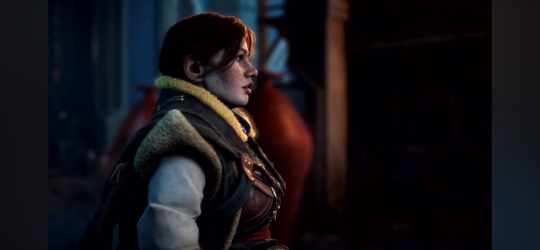


Playing Inquisition again before launch and her cute awkward chatting is making it really hard to deny I’ll be trying hard to romance her
15 notes
·
View notes
Text
Video version of Varric as a Shakespearean Fool up on my TikTok!!
2 notes
·
View notes
Text
Varric and the Shakespearean Fool

How is Varric the most Shakespearean character in Dragon Age, and one of the most complex characters in the whole series? Varric fits the archetype of the Shakespearean fool, a character trope in Shakespeare’s plays that offers deep, cutting insights hidden behind a veil of comic relief.
The fool is an ancient stock character, but Shakespeare adapted it to create arguably his most sophisticated roles. He leveraged the fool as a vehicle through which an author can speak hard truths and thematic insights to not only the other characters, but to the audience. I think the Dragon Age writers use Varric in a similar way.
Varric is a bardlike, storyteller figure who often stands to the side of the main story and reflects on it. In Dragon Age 2, for example, Varric was responsible for framing the entire narrative. The fool is based on the court jester, and one of the primary functions of a jester was actually storytelling. Varric is known for his playful sense of humor, and he uses it to mask serious observations as well as provide comic relief. Shakespeare not only used fools to provide levity during tragic events, but also as truth tellers that reveal deep insights about the other characters and broader themes. Many of Varric’s nicknames for the companions reveal deeper truths about their characters. He calls both Hawke and Solas “Chuckles,” for example, which I believe is a nod to the tragedy and tragic irony that defines them both.
Shakespearean fools are such sharp commentators because they’re outsiders that exist in-between different social categories. Varric both figuratively and literally occupies liminal spaces in the world of Thedas. As both a surface dwarf and a second son, Varric is marginalized in dwarven society and within his own family. This position gives him an outsider’s perspective that makes him such an insightful critic. When we first meet Varric, he’s living in the Hanged Man pub. Not only is a pub a place for entertainers, it’s a liminal space that exists outside of the clearly defined categories of work and home. Adding even another layer, a “hanged man” itself is a liminal figure, suspended between life and death.

Another similarity is that fools are very close to powerful people, like Hawke, but they’re not bound by the same rules or expectations. This allows them to say things the other characters can’t. Fools challenge societal expectations and authority figures, and Varric frequently questions the status quo, using humor to mask his serious observations. He also engages in philosophical discussions, offering profound insights disguised as simple banter. Varric’s conversation with Solas about the man on the island is a great example of this. Through what seems like humorous casual banter, Varric is revealing key aspects of Solas’ character, and major narrative themes.
One of Shakespeare’s most famous fools is the fool from King Lear, who serves as the King’s conscience, offering moral insights and reflections that the king cannot. My friend Aisie pointed out that Varric will likely play the role of Solas’s conscience in the Veilguard, which is yet another way we’ll see Varric functioning like a Shakespearean fool. Fools are also known for pointing out hypocrisy or folly, and I think we may see Varric do that for Solas. There’s very interesting overlap between the themes in King Lear and the Veilguard as well, but that would be a whole separate topic.
Varric fits the trope of the wise Shakespearean fool so well it could be the subject of a longer piece of writing, but hopefully this is a good start. Let me know if you agree, and if you have any questions on how Varric will fill this role in the Veilguard!
#dragon age#the veilguard#dragon age the veilguard#varric#varric tethras#dragon age varric#dragon age 2#veilguard
65 notes
·
View notes
Text
The soundtrack to your next adventure is almost here!
Dragon Age: The Veilguard Original Soundtrack, composed by Hans Zimmer and Lorne Balfe. Pre-save NOW.
701 notes
·
View notes
Text
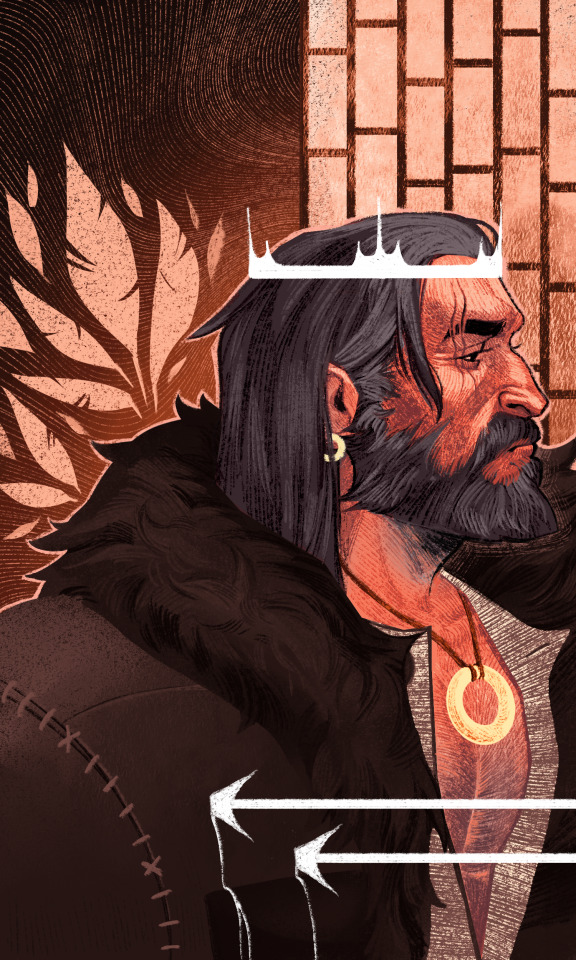
Veiltober - day 12, Varric
Bioware really made Varric come back all sexy for the 3rd time around just to NOT let me romance him AGAIN!! This is unfair and I seek legal compensation.
Going forward, I'll be trying to make compositions a little simpler for the sake of time and to not expend myself too much. It's still a long way to DATV and I wanna have some energy to actually play the game XD
Ty to @lynnerdo for the prompts !!
7K notes
·
View notes
Text

I don't know you yet, but I already love you Bellara 🦌
185 notes
·
View notes
Text
How Ragnarok predicts The Veilguard endings, in video format on my TikTok!!
#dragon age#solas#solas dragon age#solasmance#dragon age the veilguard#dragon age solas#the veilguard#veilguard spoilers#da4#veilguard speculation
3 notes
·
View notes
Text
How Ragnarok Predicts Veilguard Endings
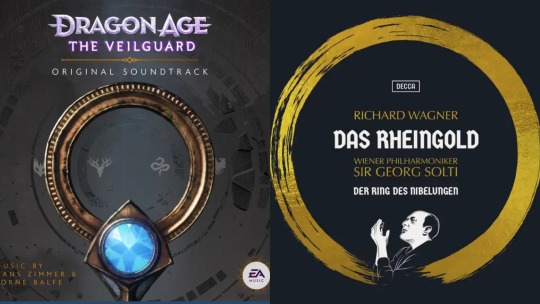
What can the norse myth of Ragnarok tell us about ending of the Veilguard? I think it can predict some major themes and plot developments.
Veilguard’s soundtrack is likely inspired by Richard Wagner and his epic fantasy work The Ring Cycle. Not only are there striking musical similarities, but the album covers use similar symbolism.
The Ring Cycle is a series of 4 operas based on Norse mythology, and it shares themes and plot elements in common with the Veilguard and Dragon Age more broadly. The Ring Cycle tells the story of the god’s downfall due to their desire for power, corruption, and greed, which is represented by a cursed golden ring of power.
The fourth and final installment of the cycle is the opera Gotterdammerung, which is German for Ragnarok, or the end of the world in norse mythology. Gotterdammerung culminates in the end of the god’s rule and influence, and the emergence of a new world driven by human and mortal choices. The Veilguard is the fourth installment of the Dragon Age franchise, and I think it will also represent the end of an old cycle and the birth of a new era.
Giant Wolves Eating Gods
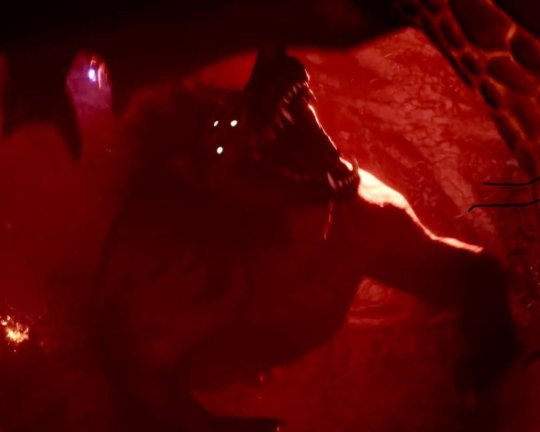
A central figure in Ragnarok is the giant wolf Fenrir, who’s name was probably inspiration for Fen’Harel. Fenrir is responsible for destroying the order of the gods. During Ragnarok, Fenrir devours Odin, the all-father and leader of the gods. Solas’s knife that can probably kill gods as well as tear down the veil is referred to as “the wolf’s fang.”
During one of the trailers, we see Solas in his Fen-Harel wolf form leaping up to take a huge bite out of Elgarn’nan. Like Odin, Elgar’nan is the head of the elven pantheon and referred to as the all-father. And like Odin’s counterpart in ring cycle, Wotan, Elgarn’nan becomes a power hungry despot.
Things do not end well for Fenrir, unfortunately, because even though he’s successful in taking down the gods, after he devours Odin, he’s killed by one of Odin’s children who rips his jaws apart. Are we going to see Ghilan’nain take out Solas? It could be a possibility on one of his paths.
A Symbolic Spear

As head of the gods, Wotan heads down a path of corruption and destruction in his quest to accumulate power. His rule and the order of the gods, along with its corruption and descent into tyranny, is represented by Wotan’s spear. We know Andruil’s spear is probably going to play a role in the game, and I think it may serve a similar symbolic purpose.
We see in his new tarot card image that Solas is holding what may be Andruil’s spear - What does it mean that Solas is holding a symbol of the god’s oppressive power and corruption? It could foreshadow a bad path for Solas, or represent how in his quest to save the world from the gods, he has in fact become just like them. Just like the other Evanuris, in his quest to tear down the veil Solas has accumulated godlike power in pursuit of his goals, and he’s willing to make sweeping unilateral judgements and decisions on behalf of millions.
We know one of the final achievements is called “The Dread Wolf Rises” and we’ll likely be facing off against Solas during the endgame. It’s possible that Solas becomes like the Evanuris no matter what path we choose and we’ll have to face him. I don’t think that means he won’t have a good path or chance at redemption based on our choices, but I think it might not come until the very end. Which brings us to my next point...
Redemption through Self-Sacrifice
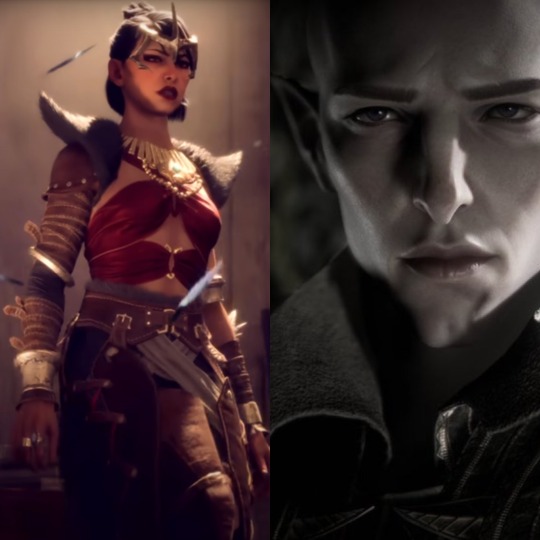
In the ring cycle, the curse of the ring is only broken through an act of self-sacrifice motivated by love. The heroine Brunhilde, a valkyrie and former servant of the gods, takes it upon herself to return the ring from where it came, ending its cycle of destruction and corruption. I think the possibility of redemption through love and sacrifice is going to be a big theme in the Veilguard, and we could see it play out with Solas’ and Morrigan’s arcs. Love in this context doesn’t need to be romantic love, it can apply to platonic love, familial love, and companionship as well. I know it’s unlikely we’ll see Keiran, which is really unfortunate, but if we did he could have an interesting role to play here.
Brunnhilde’s sacrifice represents the undoing of the god’s original sin, and marks the end of the gods' reign which allows for the possibility of a new, uncorrupted world to emerge. When I think about Brunhilde’s sacrifice, I immediately think about Morrigan and Solas. This kind of self-sacrifice would be a full circle, cycle-breaking moment for both of them. I personally wouldn’t want to see Morrigan sacrifice herself because Morrigan isn’t complicit in the gods misdeeds, whereas I think Solas is. I do think Solas was probably manipulated and exploited to a certain extent, but I think we’ll find out he’s done a lot wrong of his own volition that he’ll need to answer for. I personally can only see redemption of Solas through his death.
These are the 3 ways I see Ragnarok influencing the ending of the Veilguard. The Ring Cycle has other influences on Dragon Age and the Veilguard that I see, especially parallels between the blight and the ring’s curse, so if you want me to get into those let me know in the comments!
#dragon age#solas#solas dragon age#solasmance#morrigan#dragon age the veilguard#dragon age veilguard#veilguard spoilers#veilguard speculation#datv#the veilguard
23 notes
·
View notes
Text
SO BEAUTIFULLLLL






Baldur’s Gate 3 deluxe vinyl soundtrack artwork
45 notes
·
View notes
Text

On The Battlefield . 2024
They are a bit distracted.
________ You can commission me on my website: nananarc.art/
Inspired by a scene in the manga Karaoke Iko! by Yama Wayama
820 notes
·
View notes
Text
Zach Mendez speaking 😍 all the Veilguard actors are so talented I can’t wait until release!! ☺️
Still lurking? Zach Mendez, who plays Lucanis Dellamorte in Dragon Age: The Veilguard, has a message for you!
Join our Discord server at Discord.gg/BioWare
546 notes
·
View notes
Text
Solas and Numbers 23:23
This is another old "essay" I wrote last year after completing Inquisition and Trespasser for the first time.
The Well of Sorrows quest is called “What Pride had Wrought,” and this title is a direct reference to a biblical passage that serves as foreshadowing for Trespasser, and possibly Dreadwolf. We’re told at least once in the game that Solas means “Pride.” The Nightmare demon in the raw fade says, "Dirth ma, harellan. Ma banal enasalin. Mar solas ena mar din." (I know you, trickster. That was no victory. Your pride will be your death.)
The phrase “what pride had wrought” means “what pride had done/caused.” What has Solas done regarding the Temple of Mythal, Mythal herself, or the Well of Sorrows? This could foreshadow Solas revealing himself as Fen'Harel later on in the game. It won't be the first time the devs hid meaning in a quest title - famously, Solas's personal quest, "All New Faded for Her" is an anagram of "Dread Wolf Fen'Harel." Not a stretch to say something similar is happening with this title.
The quest title got even more interesting when I realized that the phrase “What Pride had Wrought” originates from a biblical passage, Numbers 23:23 -
"Surely there is no enchantment against Jacob, neither is there any divination against Israel: according to this time it shall be said of Jacob and of Israel, What hath God wrought!"
Matthew Henry, a 17th century British minister famous for his commentary and exposition of the bible, says that this passage means:
“Men change their minds, and break their words; but God never changes his mind, and therefore never recalls his promise. And when in Scripture he is said to repent, it does not mean any change of his mind; but only a change of his way.”
God in this context is sounding a little like someone else we know, right? If we substitute Solas (Pride) for God, as the writers have done with the quest title, Henry’s interpretation still rings true. Solas refuses to change his mind or break the promise he made to himself to restore the world to the state before the fall of Arlathan. This could be seen as foreshadowing for Solas revealing himself as Fen'harel and committing to tear down the veil in Trespasser.
The second part, “when… he is said to repent, it does not mean any change of his mind, it is only a change of his way” is very interesting to me. If we’re buying my argument that you can sub Solas for God here, it could imply an allyship with Solas in Dreadwolf - that he can repent without changing his mind about what needs to be done, but he’ll change his actions in a way that could help the protagonist? Idk.
The second part also has implications about his relationship with Lavellan. He has not changed his mind about Lavellan, but he has changed his way - instead of continuing the path of a relationship with her, he changes back to the solitary path of Din'Anshiral.
Solas’ fatal flaw, Pride, causes him to behave like God, namely that Solas makes sweeping, unilateral decisions about the fate of the world. He has no right to do that, because as he says many times, he is no god. Ironically, Solas despises the fact that the other elven mages pretend to be gods, or endeavor to behave like God. However, in single-handedly making decisions on behalf of basically all living beings, Solas is acting as a god, as much as he says he believes he is not one. And those actions result in destroying his world and everything he loves. And he’s ready to do the same damn thing all over again in an attempt to “fix” how badly he messed up the first time!
So is the quest title, “What Pride had Wrought” merely foreshadowing (foreshadowing our discovery of everything Solas has done, and what he decides to do) or does it mean that even though Solas has committed to this path, he may repent later? Or that he still holds the torch for a romanced Lavellan? I can't wait to find out!
20 notes
·
View notes
Text
Solavellan Angst and Dido & Aeneas
Here's an "essay" (more like notes) I wrote about a year ago after finishing Trespasser, and surprisingly it holds up ok! You can watch a video essay version on my TikTok @gandalfs_alt. I think the video version is a bit more polished because I wrote it yesterday, this old one is pretty rough.
Unfortunately no citations... feels weird to post w/o citations. Future posts I think I will start citing my sources.
A great love story that I see relating to Solavellan is the story of Dido and Aeneas. This story is even older than Tristan and Isolde, dating back to ancient Rome (specifically Virgil’s The Aeneid, completed in 19 BCE, about 2000 years ago). It is widely considered the archetypal love story that symbolizes the tension between love and duty in Western literature.
Dido was the Queen of Carthage, a city located in North Africa. In some versions she is a sorceress, and she is beloved by her people. Aeneas was a Trojan hero who escaped the fall of Troy. Aeneas and his fellow Trojans fled across the Mediterranean Sea after the fall of Troy. They landed in Carthage, and were welcomed by Dido, who offered them hospitality.
Dido and Aeneas spend a significant amount of time together, and fall deeply in love. Over time their love became increasingly intense. In some versions they marry. However, Jupiter (Zeus), the king of the gods, sends the messenger god Mercury (Hermes) to remind Aeneas of his duty to establish a new homeland in Italy (what becomes modern day Rome). After contemplating staying by Dido’s side, Aeneas feels that he must fulfill his divine mission to re-establish his homeland and he abandons Dido, departing for Italy.
Dido is devastated by Aeneas’ departure. In her anguish, Dido constructs a funeral pyre, on which she places Aeneas's belongings, including a sword he had left behind. She then took her own life by falling on the sword. Aeneas, unaware of Dido's fate, continues his journey to Italy, where he eventually fulfills his destiny and founds the city that would become Rome.
I think some of the parallels are pretty clear. A mysterious wandering hero fleeing the aftermath of a fallen civilization joins up with a group of people and falls in love with their leader. He then abandons said leader to fulfill what he believes is his divine mission, which is to re-establish what has fallen in a new place.
There’s two ways I think this story is helpful for understanding Solas, Lavellan, or Solavellan:
It has inspired so much art, we can look at how other artists have handled this theme to get insights into the characters, learn more about them, and learn about different ways this conflict (love vs duty) can be interpreted or represented.
If this story did in fact inspire the DA:I writers, learning more about it can possibly help uncover where they may take Solavellan in DA:D (dear god, I hope they don’t go the Dido route with Lavellan, pls no 😭)
Even though Solas is a pretty clear Aeneas type, I actually see him share a lot of attributes with Dido as well. One of the most famous versions of Dido and Aeneas is an opera (yes, opera again, lol) composed by Henry Purcell in 1689. It is one of the first operas composed in English, and is pretty much considered the premiere retelling of the Dido/Aeneas story in the English language. One of the most famous pieces from the opera is Dido’s Lament, and it’s the song Dido sings after she decides she can’t live without Aeneas, and is about to, literally, fall on a sword.
The lyrics of Dido’s lament are:
More I would, but Death invades me:
Death is now a welcome guest.
When I am laid, am laid in earth,
May my wrongs create no trouble, no
trouble in thy breast;
Remember me! Remember me! But ah!
forget my fate.
To me, this is 100% Solas’s psychological state when he leaves Lavellan. The lament is obviously very tragic and sad, but there’s something extremely stubborn and self-centered about it. It feels like a lot of self-imposed misery. In Dido’s case, she was certainly wronged by Aeneas, she was treated very unfairly and it’s not her fault at all, but her reaction to it is very self-pitying and self-sabotaging, literally and figuratively. I got the same feelings from Solas during his final confrontation with Lavellan.
“Death invades me, Death is now a welcome guest,” - Wait a minute, who says anyone has to die? Why is dying the only option here, Dido and Solas?
“May my wrongs create no trouble in thy breast,” - It seems like Dido and Aeneas have the option not to commit these wrongs or additional wrongs, so why act all stubborn and resigned about it?
The “wrong” I think Dido is referencing is her impending suicide. Solas may be referencing the same thing if he knows he is going to die, but in his case destroying the world and loving then leaving Lavellan are some other wrongs. But again, based on what we know, it seems like he has the option to stay and not destroy the world a second time. So why so stubborn?
“Remember me! But forget my fate.” My dudes. It seems to us like you’re choosing this fate. And you think we can remember you and not remember how you left us? You want Aeneas/Lavellan to hold the torch, but just forget a very monumental decision you made? That’s a little delusional. This line is so simple, but it does an excellent job of underscoring the conflict between love and sense of duty. In both cases, the heroine/hero want to be remembered by the ones they love, but at the same time they don’t want their choices to impact their lovers, or their lover’s recollection of them. Which really is impossible.
26 notes
·
View notes
Text


Chappell Hawke
Idea from @loustica_lucia on TikTok ❤️ who did a wonderful rendition of their Warden with this image as a reference
102 notes
·
View notes
Text

Wolf
A speedpaint video of this will be available at my Patreon soon!
11K notes
·
View notes

